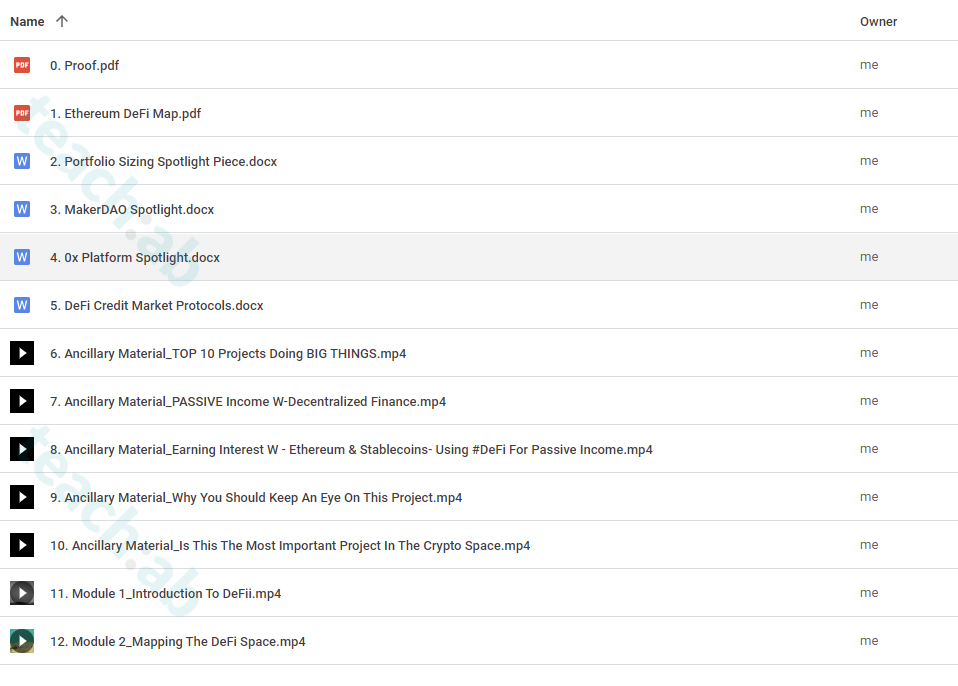-
×
 Mastering Daily Option Trading By Option Pit
1 × $93.00
Mastering Daily Option Trading By Option Pit
1 × $93.00
Financial Freedom With Decentralized Finance by Ready Set Crypto
$149.00 Original price was: $149.00.$23.10Current price is: $23.10.
SKU: C55info.38959cPmQY8jE
Category: Download
Tags: Decentralized, Finance, Financial Freedom, Ready Set Crypto
Financial Freedom through Decentralized Finance – Immediate Download!
Let See The Content Inside This Course:

Description:
The emergence of decentralized finance (DeFi) has significantly contributed to the radical change in the financial environment in recent years. This idea represents a substantial change in the way people can handle their money, moving away from conventional banking institutions and toward a more accessible and empowered model. The vast potential that DeFi provides, empowering people to take charge of their financial destinies, is highlighted by Ready Set Crypto.
Users can interact directly with a wide range of financial services by utilizing blockchain technology, opening up a new world of openness, accessibility, and independence. Within the framework of DeFi, we will examine the various facets of financial freedom in this piece and show how it opens the door to a more inclusive financial system.

Understanding the Basics of Decentralized Finance
The foundation of DeFi rests on several core technologies and principles that challenge traditional finance. At its core, decentralized finance operates on a blockchain-based infrastructure, which eliminates the need for intermediaries like banks and financial institutions. This allows users to engage directly with financial services, leading to lower costs and greater transparency in transactions.
What Is DeFi?
Decentralized finance refers to an ecosystem of financial applications that are built on blockchain technology, primarily using Ethereum. It includes a wide range of services, including lending, borrowing, trading, and investing. By eliminating middlemen, DeFi platforms aim to democratize access to financial services and empower individuals globally.
- Key Characteristics of DeFi:
- Transparency: DeFi platforms operate on public blockchains, where every transaction is recorded and can be viewed by anyone.
- Accessibility: Anyone with an internet connection can access DeFi services, making them available to people in developing countries with limited banking infrastructure.
- Autonomy: Users have full control over their funds and financial transactions without relying on traditional financial institutions.
- Core Components of DeFi:
- Smart Contracts: Self-executing contracts with the terms of the agreement directly written into lines of code.
- Decentralized Exchanges (DEXs): Platforms that facilitate peer-to-peer trading of cryptocurrencies without a central authority.
- Stablecoins: Cryptocurrencies pegged to stable assets like fiat currencies to minimize volatility.
These components create a financial landscape that is not only resilient and flexible but also inclusive, allowing more individuals to participate in financial markets.
The Transition from Traditional Finance to DeFi
Comparing traditional finance with DeFi reveals stark differences that highlight the benefits of this new model.
| Aspect | Traditional Finance | Decentralized Finance |
| Intermediaries | Banks, brokers, and other entities | Peer-to-peer transactions |
| Fees | High fees and hidden charges | Generally lower fees |
| Access | Limited by location and credit score | Universal, open to everyone |
| Control | Governed by institutions | Full control for users |
This juxtaposition illustrates not just an evolution in technology, but a revolution in mindset; individuals are no longer passive participants in a system governed by banks and financial institutions but are active stakeholders in their financial journeys.
Empowerment and Autonomy in DeFi
Financial freedom, in the context of DeFi, is primarily about empowerment. It signifies the ability for individuals to control their financial destinies free from the restrictions and limitations imposed by traditional banks.
The Role of Users in DeFi
In this new financial ecosystem, users experience an enhanced sense of ownership and responsibility over their assets. With tools that facilitate lending, borrowing, trading, and investing without intermediary involvement, DeFi platforms empower users to make financial decisions that directly impact their lives.
- Empowered Users:
- The ability to lend assets and earn interest without a bank’s intervention.
- Direct access to global financial markets, democratizing investing opportunities.
- Active participation in governance decisions through voting mechanisms on decentralized protocols.
This empowerment can be likened to a ship setting sail on uncharted waters, where each individual can chart their course without the constraints of a captain the banks.
The Psychological Shift Towards Financial Independence
The psychological implications of adopting DeFi are profound. Individuals often feel a renewed sense of financial literacy and responsibility. This shift fosters a culture of financial independence and education, encouraging users to learn about concepts such as yield farming and liquidity pools.
- Key psychological benefits:
- Increased confidence in managing personal finances.
- Reduced anxiety associated with hidden fees and banking regulations.
- Greater control leading to improved decision-making in investments.
The sense of control translates into a more strategic approach to personal finance, as users become more engaged and informed about the choices available to them.
Benefits of DeFi for the Average User
The allure of DeFi lies not only in its innovative technology but also in the tangible benefits it offers to users. From lower fees to faster transactions, the advantages of engaging with decentralized finance are numerous and compelling.
Financial Inclusivity in DeFi
One of the most promising aspects of DeFi is its potential to offer financial services to those traditionally marginalized by conventional banking systems.
- Benefits of Financial Inclusivity:
- Access to banking services for the unbanked population.
- Opportunities for small-scale investors to compete in global markets.
- Lower barriers to entry for loans and investment products.
Cost Efficiency and Speed
In DeFi, users often experience reduced transaction times and costs. Traditional banking systems can involve lengthy processes, laden with bureaucratic hurdles. In contrast, DeFi transactions occur almost instantaneously and are often accompanied by minimal fees.
- Cost Comparisons:
- Traditional crypto exchanges can charge as much as 3% in transaction fees.
- DeFi platforms, like Uniswap and Aave, often have fees below 1%.
This degree of efficiency can be particularly impactful for users operating on tight margins, as the savings can accumulate significantly over time.
The Challenges Faced by DeFi
Despite the numerous benefits, DeFi is not without its pitfalls. The very nature of decentralization presents unique challenges that users must navigate.
Risks and Vulnerabilities in DeFi
The security of smart contracts and the potential for hacks remain pressing issues in the DeFi landscape. As users venture into this innovative space, awareness of these risks is paramount.
- Types of Risks:
- Smart Contract Vulnerabilities: Bugs can lead to significant financial losses.
- Market Volatility: Cryptocurrency prices can fluctuate wildly, impacting investments.
- Regulatory Risks: As governments catch up with the technology, new regulations may be imposed.
The Importance of Due Diligence
For users seeking financial freedom, conducting thorough research and understanding the platforms they engage with is crucial. This degree of diligence can mitigate risks and enhance user experience.
- Steps for Safe Engagement:
- Conduct research on the reliability of projects before investing.
- Stay updated on security audits and community feedback.
- Utilize reliable DeFi tools to analyze market movements.
Understanding the risks associated with DeFi allows users to navigate this new landscape with confidence and clarity, ensuring they are well-equipped to manage their financial assets.
The Future of DeFi and Financial Freedom
As we stand on the precipice of a new financial era, the future of decentralized finance holds immense promise. The potential to reshape the global financial ecosystem is vast, and users are quickly recognizing the numerous opportunities that lie ahead.
Innovations on the Horizon
With rapid advancements in blockchain technology, we can expect to see even more innovative solutions emerging in the DeFi space.
- Emerging Trends:
- Integration of artificial intelligence for investment strategies.
- Development of cross-chain solutions to improve interoperability among blockchains.
- Enhanced governance models that empower community decision-making.
Such advancements could lead us to a more seamless and user-friendly DeFi experience, further promoting the ideals of transparency, inclusivity, and autonomy.
DeFi as a Tool for Financial Literacy
A fundamental aspect of financial freedom is education. As the DeFi space grows, its potential to promote financial literacy becomes ever more significant. Programs aimed at educating individuals on the nuances of decentralized finance will be vital for empowering users.
- Educational Initiatives:
- Workshops and webinars on DeFi platforms and their functionalities.
- Resources for understanding market dynamics and risk management.
- Community-driven support networks to assist newcomers.
By fostering financial literacy, we empower individuals to make informed decisions, thereby enhancing their ability to achieve true financial freedom.
Conclusion
The rise of decentralized finance represents a significant change in the personal finance scene by giving people previously unheard-of authority and control over their money. DeFi offers routes to financial independence that go beyond the constraints of conventional banking institutions, with transparency, accessibility, and autonomy serving as its guiding principles. Users must, however, continue to be aware of the risks involved and make a commitment to lifelong learning in this ever-changing field. We anticipate that the path to financial independence via decentralized finance will be both thrilling and crucial, leading us to a more open and transparent future.
Frequently Requested Enquiries:
Innovation in Business Models: We employ a group buying strategy that allows customers to divide costs and receive a lower rate for popular courses. Despite content providers’ concerns about distribution tactics, this approach benefits low-income individuals.
Legal Aspects: The legality of our conduct raises a number of complex issues. Although we do not have the course developer’s official permission to redistribute their content, there are no clear resale restrictions stated at the time of purchase. We have the opportunity to provide affordable educational resources because of this uncertainty.
Quality Control: We ensure that all of the course materials we purchase are identical to those supplied by the writers. However, it is important to understand that we are not approved vendors. Consequently, our products don’t include:
– In-person consultations or phone conversations with the course developer for advice.
– Access to sites or organizations that are exclusive to authors.
– Engaging in private forums.
– Simple email support from the author or their team.
By offering these courses independently, without the premium services of the official channels, we hope to reduce the barrier to education. We appreciate your understanding of our unique approach.
Be the first to review “Financial Freedom With Decentralized Finance by Ready Set Crypto” Cancel reply
You must be logged in to post a review.

















Reviews
There are no reviews yet.